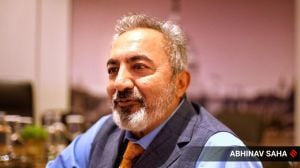Yadavs of Punjab seek OBC status, live as proud Sikhs while holding on to Lord Krishna’s legacy
In Punjab, the Yadav community is placed under the Backward Classes (BC) category and not under the Other Backward Classes (OBC) category of the Central Government.
 Mishra Singh Yadav along with his family in Nihalgarh village of district Sangrur. (Express photo by Raakhi Jagga)
Mishra Singh Yadav along with his family in Nihalgarh village of district Sangrur. (Express photo by Raakhi Jagga)
Sixty-year-old Mishra Singh Yadav lives with his wife Rani Kaur in Nihalgarh village of Punjab’s Sangrur district. Their house, set amid lush agricultural fields, has its own biogas plant, and all cooking is done using this gas, as Mukhtiar, his mother, in her late 80s, points out with pride. The family may carry the surname Yadav, but their lifestyle is deeply rooted in Sikh traditions. Mishra wears a turban while his wife is an Amritdhari Sikh.
Mishra Singh Yadav is among the two lakh Yadavs who are spread across Punjab, with the majority of them concentrated in Patiala and Jind Riyasat after the 1857 revolt. Across Patiala and Sangrur districts, around 35,000 to 40,000 Ahir Yadavs live in nearly 30 villages. They proudly call themselves the “Yadavs of Punjab.”
Yet, beneath this pride lies a long-standing struggle. In Punjab, the Yadav community is placed under the Backward Classes (BC) category and not under the Other Backward Classes (OBC) category of the Central Government. “This means that Yadavs in Punjab are entitled to reservation benefits only at the state level — for state government jobs, admissions, and schemes. But they cannot avail the benefits of the central OBC quota in UPSC, central universities, or central government employment,” explains Jarnail Singh Yadav, 72, hailing from Patiala’s Dugal Kalan village.
 Yadav community residents outside the village gurdwara in Nihalgarh village (Express photo by Raakhi Jagga)
Yadav community residents outside the village gurdwara in Nihalgarh village (Express photo by Raakhi Jagga)
Mishra Singh Yadav says his forefathers settled in Punjab after the 1857 freedom struggle, and eventually, they were raised as Sikhs. “We are no doubt followers of Lord Krishna, but we do go to gurdwaras, follow the teachings of Guru Granth Sahib, and our names also suggest that we very much belong to Punjab and vice versa,” he says.
Owning about 10 acres of farmland, Mishra represents the identity of Nihalgarh village, which has a sizeable Yadav population.
“Around 700 out of approximately 1,000 voters of our village are Yadavs,” he points out, while his son Manpreet Singh Yadav helps him in farming. All of them go to the gurdwara, a symbol of their assimilation into Punjab’s Sikh way of life.
Vijay Yadav, secretary general of Punjab Yadav Mahasabha, said, “Once the 1857 revolt backfired in many parts of the country, many Yadavs came to this pocket and started living here, and eventually a few of them followed Sikhism.”
A few kilometres away from Nihalgarh, Jarnail Singh Yadav, with his three sons, their wives, and grandchildren, holds close to his 8 acres of farmland. “We don’t have a temple in the village but every year we do celebrate Janamashtmi at a common place where the Yadavs of nearby villages also gather. No doubt the family follows the teachings of Guru Granth Sahib and even goes to gurdwara on a daily basis,” Jarnail Singh Yadav says.
Yadavs in Punjab embody principle of assimilation
Turban-wearing, with flowing beards, Punjabi names, and the customary “Singh” added to their names, they embody the principle of assimilation. “Only our surname tells that we are Yadavs, but otherwise our forefathers who got settled here followed the principle of jaisa desh vaisa bhesh,” says Jarnail Singh Yadav.
Villages like Kulerian in Sangrur and Devigarh, Bhootgarh, and Hariau Kalan in Patiala are home to these Ahir Yadavs, while just across the border, Cheeka and Kharaudi in Haryana’s Kaithal district also have turban-wearing Yadavs.
Vijay Yadav adds, “Mostly, the ones living in Sangrur and Patiala villages are farmers, and many of them are efficient in using combines, harvesters, and they take them to other states such as Uttar Pradesh, Bihar, Madhya Pradesh to carry out harvesting operations to earn money”.
Yadavs are recognised as OBC in other states
The exclusion of the Yadavs from the OBC category, villagers say, applies to all Yadavs in Punjab. “The situation is the same for all Yadav inhabitants of Punjab; no matter whether they have been living for decades or a few years after migrating from other states,” says Manpreet Singh Yadav from Nihalgarh.
The contrast with neighbouring states is stark. “However, the situation is different in many other states. In states like Uttar Pradesh, Bihar, Haryana, Rajasthan, and Madhya Pradesh, Yadavs are recognised as OBC at both the state and central levels. As a result, they are eligible for the 27 per cent OBC reservation in central government jobs and institutions, in addition to state benefits. We have been fighting for our OBC status for a long time, but have yet to get this demand fulfilled,” says Mishra Singh.
According to Ram Chandra Yadav, former Punjab Pravasi Board chairman, Yadavs got BC status in Punjab during the tenure of the SAD-BJP government in October 2016. “But yes, the Yadavs of Punjab are still to get into the records of the Central Government to get OBC status,” he added.
Vijay Yadav said that after the Yadavs got BC status in Punjab in October 2016, they were to get OBC status in the Centre as well. “But the file was never moved all these years. About two months ago, Punjab Minister Dr Baljit Kaur moved our file, and we hope to get included in the OBC list like that of our Haryana counterparts,” he remarked.







